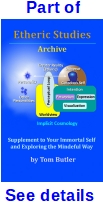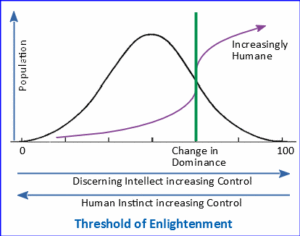Seeking 101
Introduction
 Our modern spirituality began with Hermetic Egypt some 6,0
Our modern spirituality began with Hermetic Egypt some 6,0
00 years ago. We can follow the Hermetic teaching to the Indus Valley Civilization. Some 4,000 years ago, the oral tradition of that civilization inspired the oldest scriptures of Hinduism.
The important messages of the ancient traditions are that we are spiritual beings experiencing this lifetime and that it is our responsibility as spiritual beings to wisely choose between the pleasures of physical life and the opportunities for greater understanding offered by more meaningful experiences. If you have ever hoped that you will not need to reincarnate—that you will finally gain the spiritual maturity necessary to move on to a more advanced spiritual existence—it is the selection of the Meaningful Way that will take you there. The Pleasurable Way is the path chosen by your human’s survival instincts which leads to certain reincarnation—the endless wheel of life.
The terminology used in the Katha Upanishad (I-II) is that the wise person uses Discriminating Intellect to select the Preferable Way over the Pleasurable Way. In contemporary usage, we think of the Preferable Way as the Meaningful Way. And so, a Spiritualist, or spiritualist-minded person, seeks to recognize and follow the meaningful way. The question I address in this Discourse is how we can let this understanding guide our seeking.
I have written several essays about this as I refined the models I use to study these concepts. Here are the essential points:
We inherit our spiritual nature from Infinite Intelligence
Members of the National Spiritualist Association of Churches (NSAC) recite the Declaration of Principles in every Sunday meeting because they represent the foundation ideas of Spiritualism. It is necessary to understand them to understand Spiritualism.
-
-
- We believe in Infinite Intelligence.
- We believe that the phenomena of Nature, both physical and spiritual, are the expression of Infinite Intelligence.
- We affirm that a correct understanding of such expression and living in accordance therewith, constitute true religion.
- We affirm that the existence and personal identity of the individual continue after the change called death.
- We affirm that communication with the so-called dead is a fact, scientifically proved by the phenomena of Spiritualism.
- We believe that the highest morality is contained in the Golden Rule: “Do unto others as you would have them do unto you.”
- We affirm the moral responsibility of individuals and that we make our own happiness or unhappiness as we obey or disobey Nature’s physical and spiritual laws.
- We affirm that the doorway to reformation is never closed against any soul, here or hereafter.
- We affirm that the precepts of Prophecy and Healing are Divine attributes, proven through Mediumship.
-
It is important to recognize that the Principles have implied meaning beyond the actual text. Principles 1 through 3 tells us that God is not an old bearded man sitting on a throne, judging our every move. Infinite Intelligence is Spiritualist’s name for reality and the organizing principles we know as Natural Law.
Thus, we say that true religion is understanding Natural Law and living in accordance with that understanding.
Purpose
Principle 8 is full of implied meaning beyond the obvious implication that we continue to live and experience life after physical death. An important implication is that we are expected to progress in our understanding of and ability to live in accordance with the principles of Natural Law.
Humanism is morality
Principle 7 is the one I want to address here. It implies that we understand morality and are able to make decisions that allow us to live in accordance with that understanding.
While this is an excellent intention, it is one thing to know our purpose and a very different thing to know how to achieve our purpose. The ancients taught that we have a spiritual nature which is our true self but that we must contend with our human’s instinctual nature in daily living.
Human Instincts
Beginning with our birth, our behavior is dominated by our human’s instincts. Unless we pause to consider our actions, our human’s instincts will turn us toward self-serving decisions that may be best for our physical self, but which may not further our spiritual growth.
Spiritual Instincts
As Spiritualists-minded people, we accept the idea that we are immortal personality having a human experience. The purpose for this lifetime is to gain understanding about the nature of Infinite Intelligence through daily experiences. In this view, our spiritual instinct is to gain understanding through experiences.
Enlightenment
While we are not our physical body, everything we experience, beginning with our birth, tells us we are our human. This body-centric perspective makes it natural to allow ourselves to be guided by our human’s instincts.
Not all, but some of us reach a point in our lifetime in which we become aware that there is a difference between our physical and spiritual natures. Remember the saying “Before enlightenment, chop wood, carry water. After enlightenment, chop wood, carry water”? Enlightenment is the conscious realization of the need to seek greater understanding. It is the first step on the way toward seeking self-understanding. Few of us take that first step.
Deciding what we think
Think of our mostly unconscious self as our Judge. The Judge makes decisions based on our worldview which includes memory, what we have been taught to be true, human instincts and understanding.
Think of our conscious self as the Experiencer. The Experiencer is able to influence the Judge with intention but is otherwise only aware of what the Judge tells it as truth.
Our Judge gives our conscious self (the experiencer) information about the world as it is sensed by our human and translated by our perceptual processes based on worldview. In effect, our Judge tells us what we think. Mostly, we react to the world.
Discerning Intellect
Our Discerning Intellect is the expression of our conscious decision to seek spiritual maturity. It is the mental faculty that allows us to guide our every decision and act toward a more spiritual expression of who we are. With it, we are more able to be purposeful with discernment, rather than simply react with our human’s instincts.
In practice, enlightenment allows our conscious self to begin awakening our discerning intellect.
The Pleasurable Way of human instincts
The ancients referred to the path shown us by our human’s instincts as the more Pleasurable Way. This way pleases our human’s urge to assure survival and the dominance of its genes.
The Meaningful Way of discerning intellect
The ancients referred to the path shown us by our spiritual nature as the Meaningful Way. This way may be difficult but will lead us to experiences that further our understanding.
Our goal then is to turn toward the Meaningful Way
There are many approaches to learning to allow our spiritual nature to manage our human’s baser nature. The most important thing for us to learn is to pause and think about the implications of our thoughts and the consequences of our actions. The Mindful Way is flowed by learning to always question if we are thinking and behaving as an immortal self or as a human.
![]()

